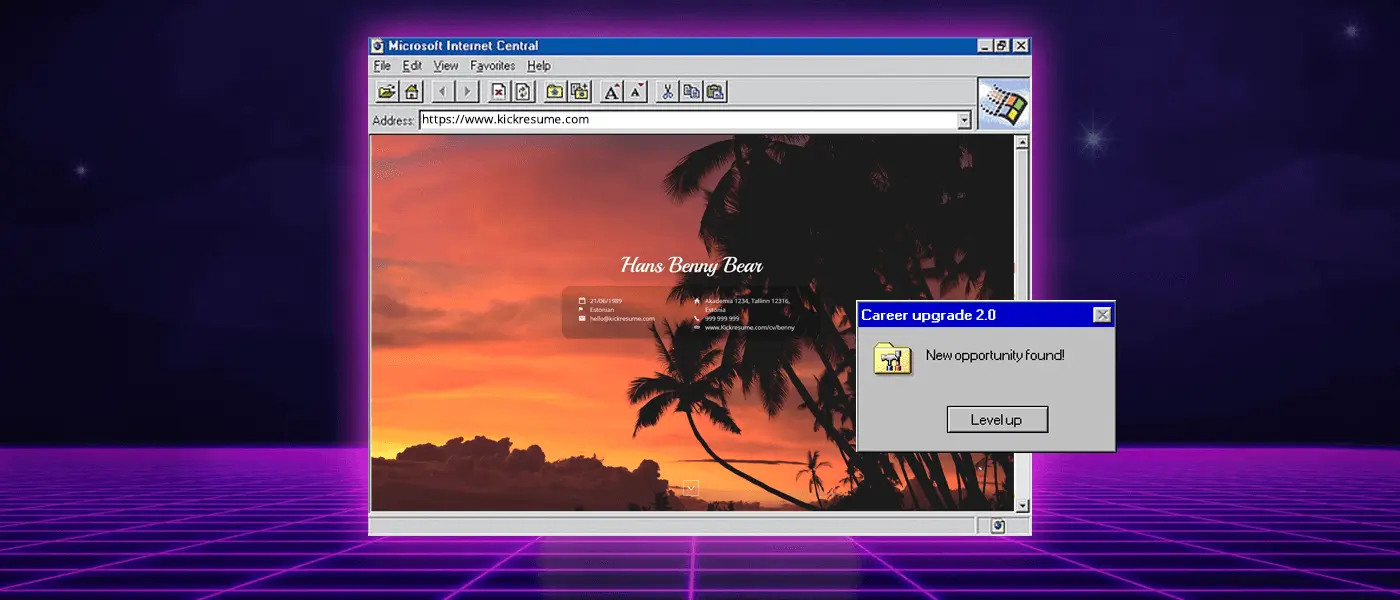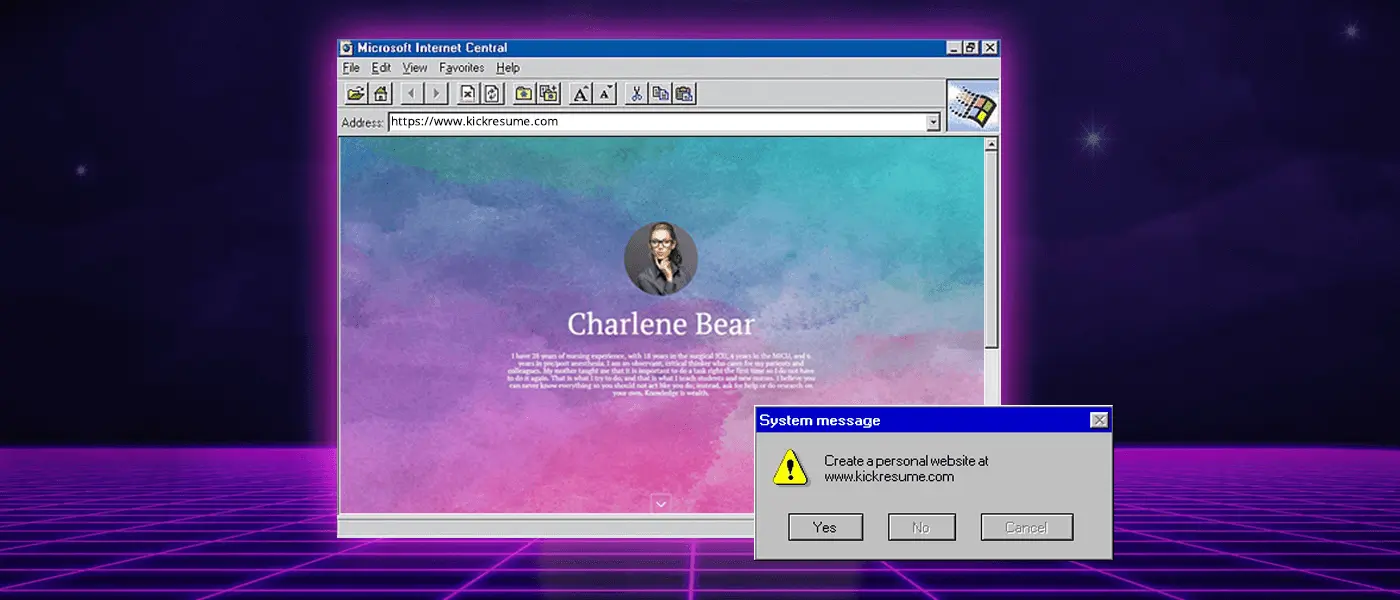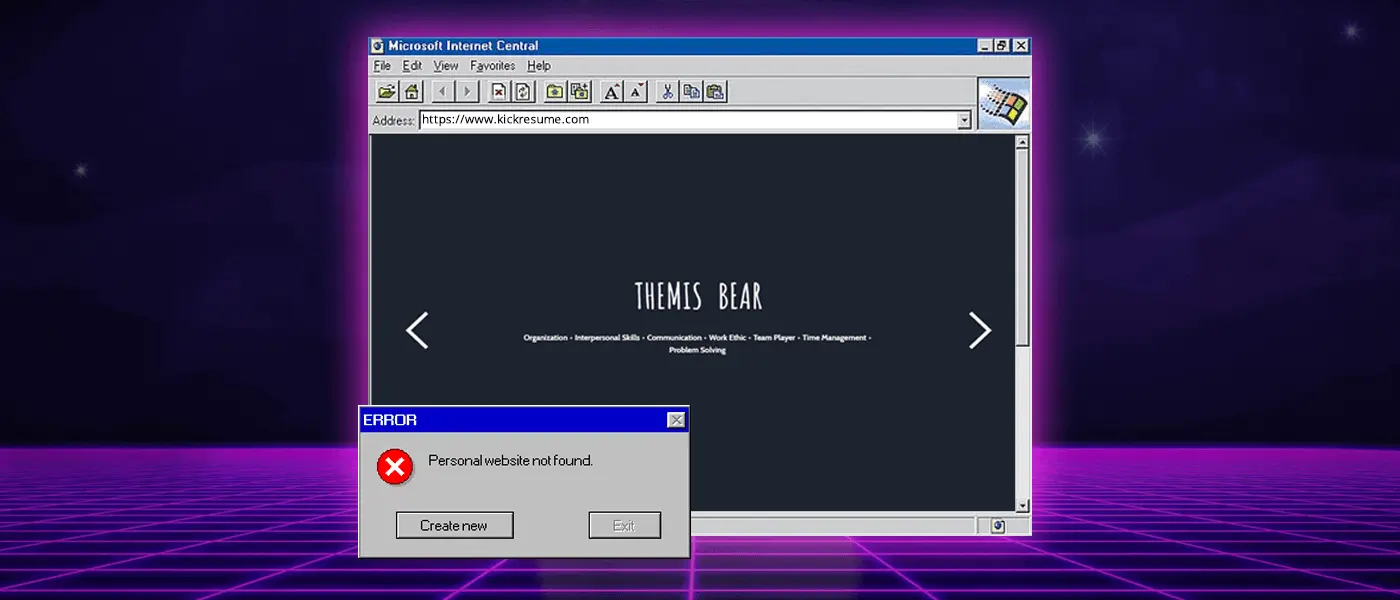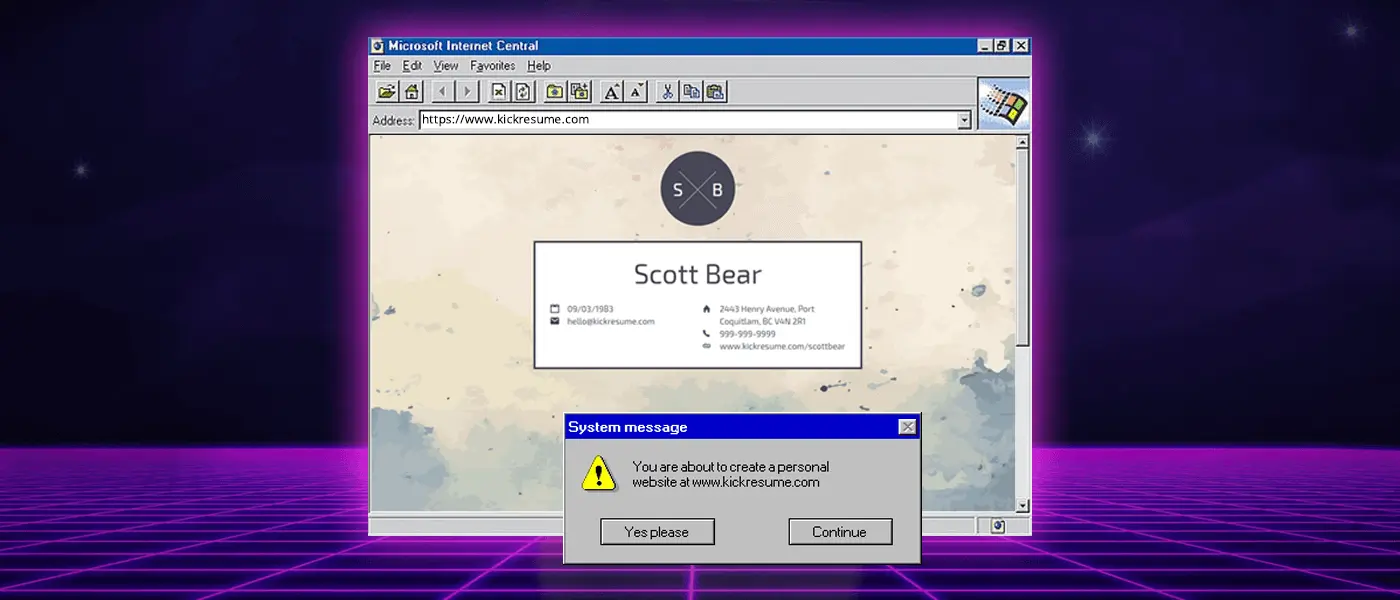So you decided to apply for that job of your dreams. You know you need to stand out. After all, the competition is going to be fierce.
Surely, you could use casual language in your email, attach a special video, or send a cake (true story). However, hiring managers rarely welcome such approaches, as they often come across as forced.
If you're thinking "Oh no, the cake was my best idea! Just tell me what to do already.”
Create a personal website. Why? Because it’s versatile, useful, more engaging and even...more fun.
- Why should you have a personal website?
- Have you met AIDA?
- Attention: Make them listen
- Interest: Make them want to know more
- Desire: Make them want you in their tea
- Results! Give them results!
- Action: Don’t let them stay cold
- The ultimate Don’t-Forget-About-This-Before-Launching-Your-Personal-Website Checklist
Why should you have a personal website?
56% of all hiring managers are more impressed by a candidate’s personal website than by any other personal branding tool—however, only 7% of job seekers actually have a personal website. (Forbes)
What does that tell you? If you need to sell your brand as an employee, creating a personal website might be the best way to do it.
Your name, your story, your experience, your skills, your personality as well as your voice, it’s all your brand. The time has changed and today, you need to be the marketer of your own story.
The thing is, most companies don’t look for mediocre employees.
They want high achievers, especially in the tech and startup world. These are the people who will help the company grow while also forming its culture. Nobody wants to employ a drifter who would just sit there at their meetings.
Yup, brutal, but true, and there is almost nothing you can do about it, only adjust.
The best way to let them know you’re such a unicorn (or narwhal, or whichever you want) is to give your future employer a proof.
Do you still need more reasons to create a personal career website? Here you go:
1. People can easily reach you
The disadvantage of a resume is that you send it out privately and usually only a couple of people from the company you’re applying for will see it. The thing with a personal website is that it's online and therefore, for everyone in the vast world of internet to see.
You might not want to disclose personal information about yourself online. But you don’t have to worry. To reveal information about your professional life is not that much of a threat (you do the same on your LinkedIn profile anyway).
On the contrary, it might help you because you never know who sees your profile and contacts you (of course, it goes without saying that you should always put your contact information on as well).
2. It helps you stand out
You need to demonstrate that you’re willing to invest time and effort into everything important you do (such as getting a new job). This way you can prove you approach things differently from other applicants.
Even though it’s quite easy to create a personal website, still many people don’t make the effort. If you put a link to your website on your resume you’ll appear much more professional.
Of course, make sure your website is nicely designed and includes quality content. Because to have a website isn’t everything. You need to actually have a good website.
3. More space to showcase yourself
You simply can't show enough of your abilities through a resume, even if you list down your skills.
A resume is just a brief overview of your professional work, but a personal career website can show a lot more from your work.
Especially when you’re after a creative kind of job, it's a must-have.
4. You control your online presence
This is quite an important thing. There’s been so much talk already about the hiring managers googling the candidates and going over their social media sites.
If you have a personal website, they’ll find all the relevant info about you on it and then don’t need to take your Facebook or Twitter profile that much into account.
Of course, this doesn't mean that you shouldn't care about how you present yourself on social networks. Remember that you have almost full control over what hiring managers are going to see when they look you up.
5. You improve your skills
Like we already said, if you have your own personal website, you’ll come across more professional. Building of a personal web is yet another experience you get in order to get your dream job.
You enhance your skills in coding, web design, graphic design, copywriting, and so on.
And even if you don’t build your website from scratch, but rather use one of the pre-designed templates in one of the quality hosting platforms, it’s still a creative work that helps you improve.
But enough about the reasons why to create one. Let's get down to the more important part — how to create a personal website that will help you score your next job?
Have you met AIDA?
If you ever had a chance to wet your fingers in the marketing waters, you’ve definitely met AIDA. I'm not talking about the opera but about the acronym: Attention, Interest, Desire, Action.
Marketers tend to see this formula as their holy grail, which may be a bit too much. But it works. So why not use it when creating your personal website? All in all, its purpose is to help you attract the hiring manager enough to invite you over for an interview.
Actually, let us talk about this in detail. What is the ultimate goal of a personal website in job search?
Though counterintuitive, it’s not landing on the job itself. There’s just a small chance you’ll get the job right after the hiring manager lands on your website. Unless they are looking for a freelancer, of course.
Your personal website’s ultimate goal is to make them invite you to a job interview. Then, and only then, the website has fulfilled its purpose
When thinking about your personal website, use the marketing AIDA as a guideline. In the end, you are becoming the marketing and sales department of YOUR NAME, INC. You have to promote and sell your skills, experience, knowledge, as well as your desire for a new challenge.
Now, the AIDA steps seem confusing or not sufficiently self-explanatory. And that’s ok. Here’s a snapshot of what's behind them in terms of your personal website.
Attention: Make them listen
Even if you're the best of the best for the job, as long as the company doesn’t know about you, it means nothing.
Therefore your first goal is to attract the attention of the hiring managers. How?
You spot a job posting on company's career page. It says you should send them your CV and cover letter. Do it, even though you have a website to which you can point them. You don’t want your potential employer to see how slack you are when you can't meet such a basic requirement as attaching your resume.
However, the email, that first contact, is precisely your chance to impress.
Your goal is to point out that you have a personal website. That fact alone says a lot. It means the company is worth it, it proves you’re fully committed to getting that job and you’ve put time and effort into the process.
It will let them know you're willing to go one step further than most.
With a well-written copy, your goal is to direct the recruiter to your website. Once they click it, your chances of getting a job skyrocket. Still, it’s just the first step.
Interest: Make them want to know more
Once the recruiter lands on your website, you need to have a great introduction, clear structure and give the best first impression. You want to hook them up and not let go. Even more, you want them to want to know more about you. Try to inspire genuine interest.
To achieve that, have a powerful landing page design. Powerful does not mean complicated, oversaturated with pictures, lines, objects, and so on. Simple can still be powerful.
Not really a design person? No worries. Your website's content matters more than its looks, in most cases. If you have excellent skills and experience to show, it goes a much longer way than just sexy aesthetics.
Short introduction or bio is the most important part of the landing page. Make sure you don’t overdo it, a few short paragraphs will suffice. Who are you? What do you know? What is your current role? What value can you provide? What are you looking for? What’s your life philosophy and maybe what hobbies do you have? An AI summary generator tool might come in handy here for more concise paragraphs.
This is more than enough to help the recruiter decide whether your application is worth pursuing or not.
As a student who doesn’t have enough experience, you might also mention what are you career aspirations for the future. Are you a Finance student? Say you're an aspiring investment banker.
On the other hand, say only so much that the hiring manager would want to know more about you and your experience. Be it several words or two to three paragraphs, introduction needs to make them interested.
Desire: Make them want you in their tea
Once you get them hooked, recruiters are going to want to see a proof of your claims and specific results. That's an excellent opportunity for you to showcase your strongest qualities.
One of the crucial features of your personal website is personal tone. Show your personality. In the end, you want to become their colleague. They want to know who you are. Of course, you still want to maintain a certain level professionalism.
You also want to describe specific challenges you faced and how you tackled them. Don't forget to also mention any successful side-projects you initiated to support your community.
Don’t state your love for design. Explain how you used design thinking in solving a particular problem.
Results! Give them results!
Be prepared to back each of your claims by specific examples. Did you manage to increase sales by 50%? Great! Mention it and don't forget to explain how. Did you manage to invite any big names to a conference you organized? Provide a brief explanation.
List all of your relevant jobs, internships, workshops, certificates, courses, even your own hobby projects. Yup, they can also help you land on the job.
Don’t forget to use any keywords that fit the job description. But if you’ve read our guide on how to tailor your resume to a specific job description, you already know this.
Action: Don’t let them stay cold
Having passed each of the previous stages, you’re on your best way to get invited to the interview. You’ve managed to attract the hiring manager's attention and proved you’d be a great fit for their company.
Now you need give them time to think about it. This is a simple, yet crucial step. The chances they’ll come back are very high.
Keep your contact information on the screen at all times.
If not the email address itself, at the very least have a link to the contact subpage visible at all times. That way you’ll let them take action in an instant, as soon as the idea of contacting you crosses their mind.
Actually, the sole purpose of your website should be this last stage of getting in touch with you.
The ultimate Don’t-Forget-About-This-Before-Launching-Your-Personal-Website Checklist
- Do I want to set up a website on my own or use a personal website creator?
- What URL do I want to use?
- Is the URL free? If not, how can I adjust it?
- Did I buy the hosting with the domain?
- Can I set up the website from a technical point of view or do I need help?
- What do I want to tell about myself?
- What tone do I want to have?
- How the design should look like?
- Do I want to have a scrolling one-pager or several pages?
- What should be the first information and picture on my homepage?
- How do I want to present myself? Text-only, graphics, infographics, video, combined, etc.?
- What graphics do I want to use? Illustrations, stock photos, personal photos, etc.
- Can I and do I want to create the design by myself? If not, who can help?
- Can I and do I want to write the copy myself? If not, who can help?
- Do I want to have a blog page?
- Do I really want to have a blog page? Am I aware it needs to be updated regularly?
- When did I last update my website? Did I update it (eg with the right keywords) before sending out my application email?
- Did I perform a website health check to confirm everything works smoothly?
Personal Website FAQ
- What URL should I choose?
Here’s the deal. You’re promoting yourself, so use FirstNameSecondName.com (or the domain name of your country).
That is, unless you really want to showcase a specific skill, experience, or niche. Or unless your name is taken by someone else. An investment banker? Okay, might be good to go with YourFutureInvestmentBanker.com. A journalist focused on tech? TechWriter.io can work too.
Be careful, though, about search engines and SEO. Better to do some research in advance.
- One page vs multiple pages?
Depends. Single-pagers are more fluid and user-friendly. The visitor can simply scroll down and get the whole picture in one go. If you want to have a simple portfolio or resume website, this might be the way to go. Also, they’re more mobile-friendly.
As opposed to that, multi-page websites are usually more trusted and can accommodate a lot more information. Are you a designer who wants to showcase your full portfolio as well as his story and client testimonials? Multi-pager is your “weapon” of choice.
- What if I am not a designer/copywriter?
Sure you’re not. A vast majority of the population works in other professions.
Does it mean you have less chance to shine before your next employer? Come on, certainly not. You just need to put more work into it (research and study, if you have time) or pay someone to do that (freelancer portals, if you have money).
Yet, even if you don’t write the copy yourself, keep in mind you need to make sure it has your voice and the structure you’d like hiring managers to see.
- Shall I mention failed projects?
This a hard one. It varies from job description to job description. Generally, it’s better to showcase only your successes and good results.
In case the company is looking for an entrepreneurial-oriented person with experience or a sales guy, it might come in handy to mention you had your own company, which raised money from investors even though you had to close it eventually.
What proves entrepreneurial spirit better than a failed business (not talking about scam companies, but you know that already, right?).
- Can I just copy my CV onto the website?
No. Noo. Nooooo. No way. No. Not at all. Nada. Never. (Asking why? Read the part about showing your future employer you can put effort into things.)
- What are some of the best platforms to use for creating a simple personal website?
If you don’t feel like building a standalone website with hosting and WordPress, you can use a template-based platform. One of them is truly yours Kickersume’s personal website builder, which you definitely want to check out.
- Shall I use a professional photo?
Yes. Yet it doesn’t mean it has to be photographed by a professional photographer, nor you having to be neutral or boring..
Go with the flow of the website and your profession. If a creative professional, go more leisure. A banker or lawyer? A shirt or suit might go a long way.
- What if my job is not that attractive to be presented on a website?
Each and every job is attractive to be presented online. It just depends on your approach. Even planetary scientists can have jaw-dropping websites. Get it?
Mastered the art of creating a personal website to boost your job prospects? Now, take that digital savviness a step further by crafting an extraordinary resume. With our AI resume builder, you can construct a resume that adds to your online appeal.








